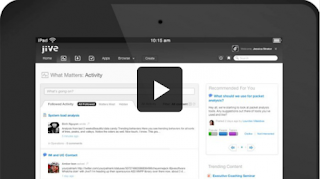http://www.uniqueworld.net/blog/mobility-contribute-social-business/
Two of the hottest trends right now are social business and mobility.
When people talk about social business, most often the first thing that springs to mind is: How do you create a tool that reaps the same benefits as Facebook, Google+ and Twitter?
In terms of mobility, the issue becomes: How can mobility contribute to the benefits of social business?
When you look at the statistics for
Facebook, there is a rapidly growing trend for users to
access via mobile. In fact, in 2012, of the 845 million Facebook users, 425
million are mobile users. That is 50.3%!
But just how big is this trend? According to a prediction by Morgan Stanley in April 2010, the number of mobile users will surpass desktop users in 2014. With an explosion in enabling technologies from Apple (iPads, iPhones), Google (Android OS), and Microsoft (Windows 8, Windows Phone 8), I can only see even greater acceleration in the adoption of mobile technologies.
These consumer trends will have an impact on how we work in the enterprise. The question is HOW will it impact the enterprise?
This YouTube presentation provides an eye-cathing overview of the growth in mobile phones to the end of 2012.
https://www.youtube.com/watch?v=0aUQLIPdtg8
I should now explain what I mean by social business and mobility.
Social Business?
Social Business is all about revolutionising how companies operate and bringing value to all employees, customers, partners, suppliers and stakeholders. It is about bringing together, connecting and engaging both internal and external individuals of an organisation to form an ecosystem. It requires an organisation to implement strategies, processes and tools to achieve the level of engagement from all parties in order to optimise the value that is generated.
Mobility?
No, I do not mean traveling on a motorised scooter! I’m actually referring to mobility in terms of accessing information from various portable devices at any time.
So how does mobility assist in social business?
Many of us have already adopted mobile technology like smart phones and tablets outside of work, and have got used to accessing cool apps that allow us to do things such as reading about our friend’s cat or their unusual interests. But when we take these devices to work and expect to do the same, we find we access can’t access information in the same way on mobile devices at work.
The main benefit of mobility for organisations is it accelerates adoption and provides agility, bringing additional value to existing applications and information. Mobility also comes with other benefits:
- Agility: Mobile devices (Smart Phones and Tablets) enable individuals to stay connected any time, wherever they are.
- Additional access channels (Mobile access): Mobile devices offer a convenient alternative for individuals to connect.
- Ease of access: Mobile devices are always on, and mobile applications are lightweight, easy to use.
- Low cost: Mobile applications are relatively easy and quick to develop.
- Sensor packed: Mobile devices contain many built-in capabilities that desktops do not always have (geolocation sensors, gyroscopes, cameras, microphones, NFC, and more). These added capabilities can come in handy for an organisation.
Mobility however comes with some risks in areas such as:
- Security: Mobile devices are unfortunately easier to lose, vulnerable to hacking and viruses. They contain so many apps (and information with it) that can be accessed without a password, they suddenly becomes a risk in the eyes of the IT department.
- IT governance: Because of the security risks involved, IT departments want to introduce policies to control the security on mobile devices. Fortunately, mobile platforms are acknowledging the need for governance and introducing features to help in this regard.
- Privacy: This is a difficult one. Mobile devices by nature are designed to be used anywhere. When sensitive information is viewed in public areas, will this pose an issue to your organisation? However, if your organisation’s social tools are opened up to people outside the organisation, does it still pose such a threat?
With each benefit it brings, mobility introduces risks, but many can be mitigated with appropriate measures.
So, who are the main players that offer mobility for the enterprise?
Currently in the market there are a number of social tools available for the enterprise. Most social mobile apps extend access to enable users to join communities, micro blog, view activity streams, and more. The point here is all these apps aim to increase engagement with more ease.
The main players in the mobile social space are:
- NewsGator
- Jive
- Telligent
- Yammer
What can we do with social business and mobility?
Besides these pre-baked mobile apps, your organisation may need to extend other social applications as mobile apps (crowdsourcing or mining information from social responses, etc).
Regardless of what mobile apps are available or possible, it is important not to get lost in the hype and excitement. It is important to understand how it will assist your organisation to achieve its strategic goals.
Ask the business:
- What is the purpose?
- How will it bring value?
- What are
your goals?
- Improve communication?
- Improve engagement?
- Improve efficiency?
- Improve access?
- Improve productivity?
- Increase lead generation?
- Reduce communication costs?
- Customers?
- Sales people?
- Executives?
- Ground staff?
- Is it to empower your mobile workforce with access to the tacit knowledge?
- Is it to make it easier to find the right matter expert?
I’d advise organisations not to get mobility tools for the sake of having the latest and greatest. Rather, they should focus on the purpose and role of mobile access in social business. Think how mobility can help deliver benefits to the organisation, then then think how mobility can contribute to social business.






